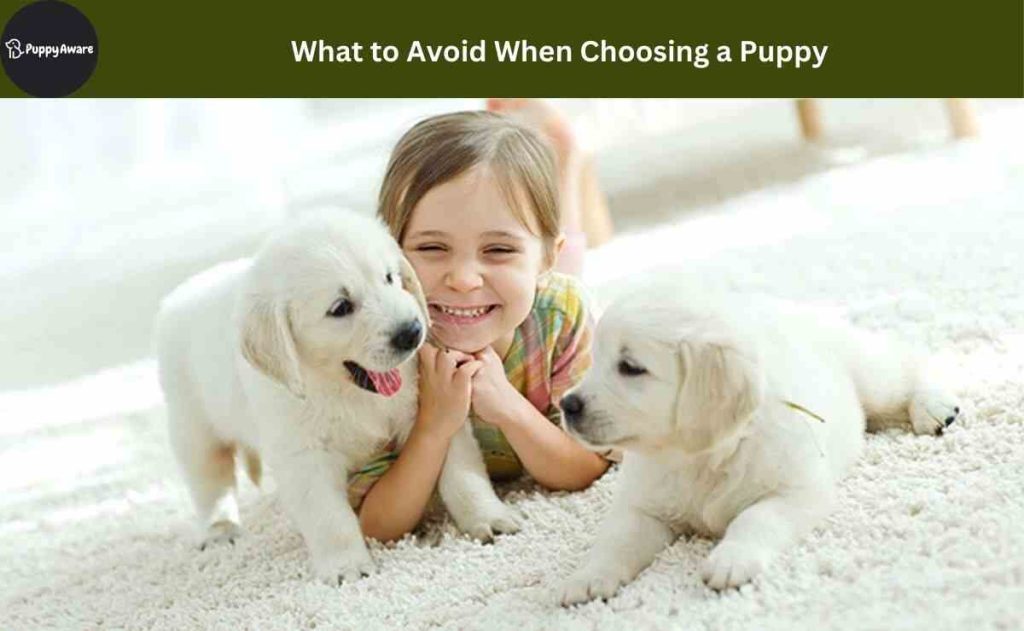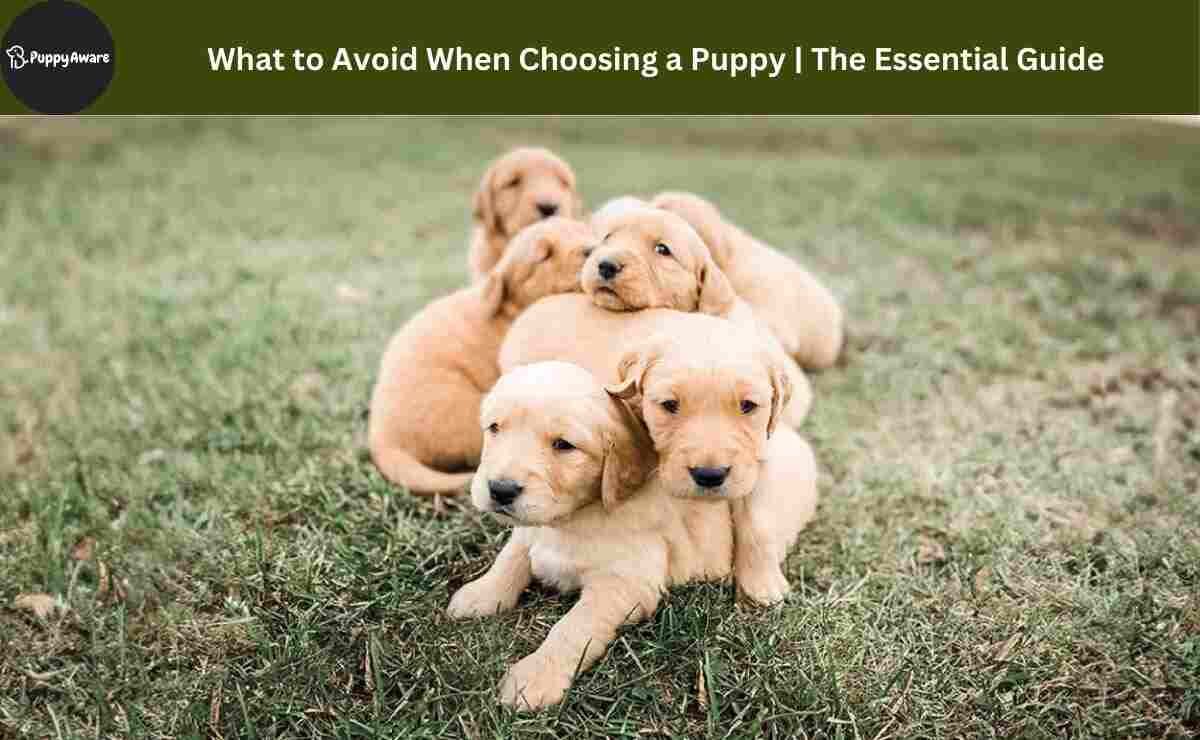Bringing a puppy into your home is an exciting milestone, but it’s a decision that should not be taken lightly. While puppies are undoubtedly adorable, what to avoid when choosing a puppy should be well known and followed. Because choosing the wrong one for your family can lead to challenges that might last for years.
Many new puppy owners make common mistakes that could easily be avoided with proper knowledge and preparation. In this guide, we’ll explore the critical factors you need to consider when selecting a puppy and what to avoid to ensure that you and your new companion are a perfect match.
Why Choosing the Right Puppy Matters
A dog can be a companion for up to 15 years or more, which means the decision you make today will impact your life for a significant period.
Puppies need more attention and care in its early stage of life. The wrong choice can lead to frustration, behavioral issues, or even the need to rehome the puppy, something no responsible pet owner wants to face.
By avoiding common mistakes, you can ensure a happy, healthy relationship between you and your future furry friend.
What to Avoid When Choosing a Puppy – Things to Consider

The following 7 things need to be considered or focused prior to choosing a puppy for your home.
1. Avoid Ignoring Your Lifestyle: Choose a Breed That Fits
It’s easy to fall in love with a puppy’s looks, but it’s critical to evaluate whether a breed will fit your current lifestyle. Each breed has unique needs when it comes to activity level, grooming, space requirements, and temperament. For example:
- Active Lifestyles: Breeds like Border Collies and Australian Shepherds require a lot of exercise and mental stimulation. If you have an active lifestyle, these dogs might be a good match.
- Apartment Living: If you live in a smaller space, breeds like Bulldogs or Shih Tzus, which are less energetic, may adapt better.
- Busy Schedules: If you work long hours or travel frequently, consider breeds that are more independent, such as the Basset Hound.
Common Mistake: People often choose high-energy breeds like Huskies or Dalmatians without considering whether they have the time and resources to provide proper exercise and stimulation. This can lead to destructive behaviors.
Solution: Take time to research the breed you are considering. Speak to breeders, veterinarians, and pet owners to get a well-rounded view of what life with that breed will entail.
2. Don’t Overlook Health and Genetic History
One of the most significant oversights when choosing a puppy is neglecting to investigate its health background.
Puppies from breeders or shelters should have a documented medical history, including vaccinations, worming treatments, and any known genetic conditions. This step is crucial because certain breeds are predisposed to health issues, such as hip dysplasia, heart disease, or respiratory problems.
Failing to consider a puppy’s health background could result in unforeseen veterinary expenses and emotional distress.
Key Health Checks
- Vaccinations: Ensure the puppy is up-to-date with core vaccines like parvovirus, distemper, and rabies.
- Deworming & Flea Treatments: Puppies should have received regular deworming and flea prevention treatments.
- Genetic Screening: Some responsible breeders offer genetic testing for conditions specific to certain breeds, such as elbow dysplasia or progressive retinal atrophy (PRA).
Common Mistake: Some new owners assume that if a puppy looks healthy, it must be free of any issues. Unfortunately, many health problems especially genetic ones don’t present symptoms until later in life.
Solution: Always request health records from the breeder or shelter. If possible, meet the puppy’s parents to observe their physical condition and temperament, as this can give you insight into the puppy’s future health and behavior.
3. Avoid Puppies from Irresponsible Breeders or Pet Stores
Not all breeders are created equal. One of the most critical mistakes new owners make is purchasing a puppy from irresponsible breeders or pet stores that source from puppy mills.
Puppy mills prioritize profit over the health and well-being of the animals, often resulting in puppies that are under-socialized, unhealthy, or genetically compromised.
Red Flags to Watch For:
- No Access to the Mother: A reputable breeder will always allow you to see the puppy’s mother and siblings. This helps you evaluate the conditions in which the puppy has been raised.
- High Turnover: If a breeder always has puppies available, it may indicate a “puppy mill” operation.
- Lack of Health Guarantees: Responsible breeders offer health guarantees and will provide genetic health certificates.
Common Mistake: Many first-time puppy buyers are swayed by low prices or impulse buys at pet stores, which often leads to getting a poorly bred or sick puppy.
Solution: Opt for a reputable breeder who follows ethical breeding practices or consider adopting from a shelter or rescue group. Research thoroughly, ask for references, and be patient in finding a reliable source.
4. Don’t Underestimate the Time Commitment
Puppies, while incredibly cute, are also a huge responsibility. One of the biggest mistakes people make when choosing a puppy is underestimating the time and effort required to properly raise and train them.
Puppies need constant supervision, training, and attention—especially during the first few months. From housebreaking to basic obedience, their early development requires patience and consistency.
Time Commitment Breakdown:
- Training and Socialization: Puppies require consistent training from the moment they come home. This includes house training, leash training, and basic commands like sit, stay, and come. Socializing your puppy is equally important—exposing them to different environments, people, and other animals will help them grow into well-adjusted adults.
- Exercise and Play: Puppies, especially energetic breeds, need regular exercise. Lack of physical and mental stimulation can lead to behavioral problems such as chewing, barking, or aggression.
- Care and Grooming: Certain breeds, particularly those with long or dense coats, require regular grooming. Additionally, you’ll need to establish a daily routine for feeding, play, and rest.
Common Mistake: Many new puppy owners are unaware of the intense time demands in the early stages, leading to frustration, improper training, or behavioral issues in the dog.
Solution: Evaluate your current schedule and lifestyle to ensure you can dedicate the necessary time to a puppy. If you work long hours or are away from home frequently, consider hiring a dog walker or enrolling in puppy daycare to ensure your pet gets the attention they need.
5. Avoid Choosing a Puppy Based on Appearance Alone
It’s easy to get caught up in a puppy’s cuteness, but looks alone should never be the primary reason for choosing a dog. Different breeds come with specific temperaments, health issues, and care requirements that may not be evident from their appearance.
While that fluffy coat or those big eyes might steal your heart, you must consider whether the dog’s personality and care needs align with your lifestyle.
Factors to Consider Beyond Appearance:
- Temperament: Different breeds have different temperaments. For example, some dogs are naturally independent and aloof, while others are highly affectionate and people-oriented. Consider whether the dog’s personality will suit your household.
- Energy Levels: Some dogs, like Jack Russell Terriers, have high energy levels and need constant stimulation. Others, like Basset Hounds, are more laid-back and enjoy lounging around. Choose a dog whose energy level matches your own.
- Long-term Care Needs: Breeds with long coats may look adorable but require regular grooming and maintenance. Other breeds might be prone to health issues that will require extra vet visits or treatments.
Common Mistake: Choosing a dog solely because it resembles one seen on social media or in movies, without considering its specific needs and whether it fits your lifestyle.
Solution: Research the breed thoroughly and prioritize temperament and lifestyle compatibility over appearance. This ensures a happier and more harmonious relationship with your future pet.
6. Don’t Rush the Decision—Take Your Time
Choosing a puppy is a significant decision that should never be made impulsively. Whether you’re adopting from a shelter or purchasing from a breeder, it’s essential to take your time to ensure you’re making the right choice.
Bringing a puppy into your home is a long-term commitment, and rushing the decision often leads to regret.
Steps to Take Before Deciding:
- Research Thoroughly: Read up on the breed you’re interested in and learn about their needs, temperament, and potential health issues. Speak with dog owners, breeders, or veterinarians to gather more insights.
- Visit Multiple Times: If possible, visit the puppy several times before making a decision. Observe their behavior in different situations and take note of their personality. Puppies can behave differently when they’re tired, excited, or nervous.
- Evaluate Your Home Environment: Think about your living situation. Do you have enough space for a large dog? Are you allowed to have pets in your apartment? Do you have a yard, or will you need to walk your dog multiple times a day for exercise?
Common Mistake: Many people make the decision to adopt a puppy based on emotions, especially when visiting a shelter or seeing a cute puppy online. This can lead to a mismatch between the dog’s needs and the owner’s ability to meet those needs.
Solution: Take a step back and evaluate your readiness for a puppy. Consider all the factors such as time, space, energy, and finances before making a commitment. If you’re unsure, consider fostering a dog first to see if you’re prepared for long-term pet ownership.
7. Avoid Neglecting Long-Term Costs
Puppies come with more than just emotional costs; the financial commitment of owning a dog is significant and often underestimated.
Many new owners focus on the initial cost of adoption or purchasing the puppy, but there are numerous ongoing expenses that should be factored in when making the decision to bring a dog into your life.
Breakdown of Puppy Ownership Costs:
- Veterinary Bills: Routine vet visits, vaccinations, flea treatments, and potential health issues can add up quickly. Pet insurance is an option but comes with monthly premiums.
- Food and Treats: High-quality dog food is essential for your puppy’s growth and health. Depending on the breed’s size, food costs can vary significantly.
- Grooming: Some breeds require regular grooming, which can become costly over time. For long-haired breeds, professional grooming every 4-6 weeks is often necessary.
- Training: Investing in professional training can prevent behavioral problems down the road. While it may seem like an upfront cost, it pays off in the long run with a well-behaved dog.
- Supplies: Beds, toys, leashes, bowls, and crates are just the basics, but these items need to be replaced periodically as your puppy grows or as wear and tear sets in.
Common Mistake: Many new owners don’t consider the long-term financial responsibility of owning a dog and end up feeling overwhelmed by the ongoing costs.
Solution: Create a budget before getting a puppy. Factor in initial costs (adoption fees, vaccinations, etc.) as well as long-term expenses like food, grooming, and medical care. This ensures you’re financially prepared for the commitment.
Conclusion – Making the Right Choice
Choosing a puppy is one of the most exciting decisions you’ll make, but it’s also a decision that requires careful thought and preparation. A well-chosen puppy will bring years of companionship and joy, but this can only happen if the right steps are taken before bringing them home.
Remember, your goal is to find a puppy that matches your lifestyle, personality, and long-term commitments. When you take your time and do your research, you’ll not only find the perfect puppy but also ensure a happy, healthy life for your new furry friend.
